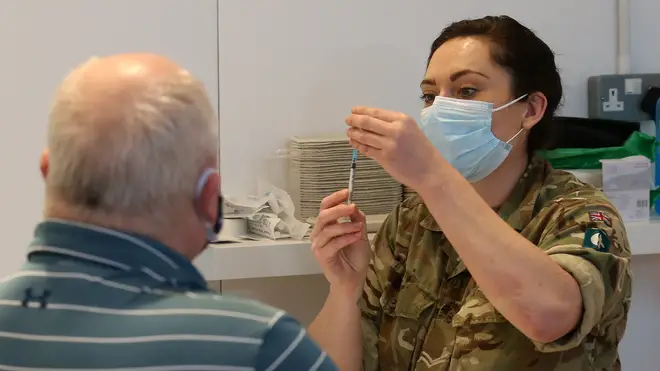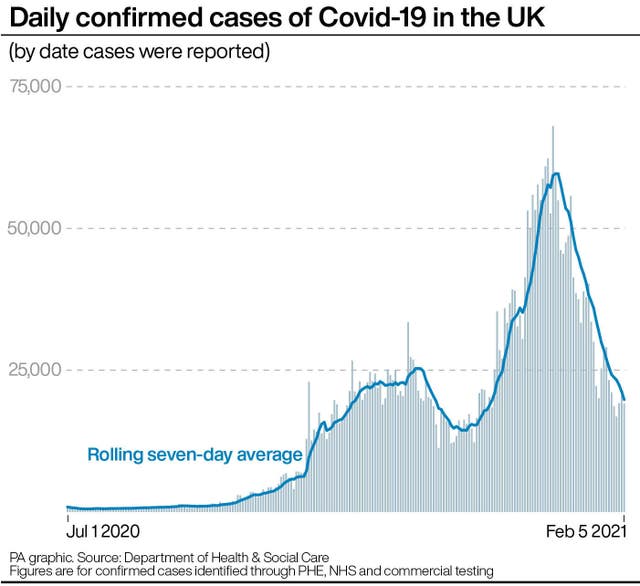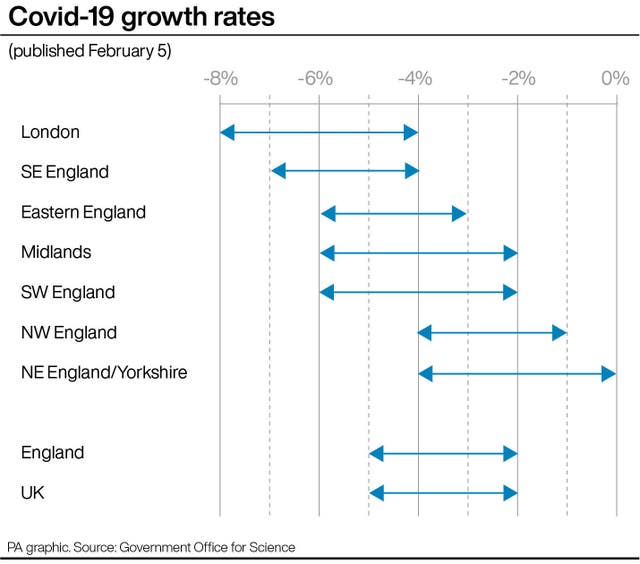
Iain Dale 10am - 1pm
5 February 2021, 20:34

The announcement came as new research from Oxford University suggested its vaccine is effective at fighting the new UK coronavirus variant.
More than half of all UK adults should receive a coronavirus vaccine by May, the Government has announced, as the jabs rollout was buoyed by studies suggesting they are safe and effective against a new strain.
Downing Street confirmed that the vaccine programme planned to reach all those aged 50 and over, as well as adults aged 16-65 in an at-risk group, by May – having previously said it aimed to do so “by the spring”.
Health Secretary Matt Hancock warned that “lots of things have got to go right” to hit the goal, including supply, but he said he was “sure” it was achievable. More than 10.9 million first doses have already been given.
According to the Government’s vaccines delivery plan, some 32 million people across the UK are estimated to fall into the first nine groups. There are 52.7 million people aged 18 and over in the UK.
The target was disclosed as the Cabinet Office announced that local elections in England and Wales would go ahead as planned on May 6 – though voters will have to wear face coverings and will be asked to take their own pen or pencil to mark their ballot.
It will be seen as indicative of lockdown restrictions easing in the spring, with reports that outdoor team and individual sports, as well as outdoor gatherings, could be possible within weeks of a planned return of schools from March 8.
The Prime Minister has faced sustained pressure from some Tory backbenchers to relax the measures as soon as possible.
On Friday, Boris Johnson reiterated his promise to announce a “steady programme for beginning to unlock” on February 22, but warned it was “still early days” and urged the public to continue following lockdown rules.
A quick update from me on where we are. Some encouraging progress this week, but we’re not there yet. This weekend please stay at home to protect the NHS and save lives. pic.twitter.com/oyOwwfyadB
— Boris Johnson (@BorisJohnson) February 5, 2021
Scientists advising the Government have warned against opening society up too quickly.
Professor Graham Medley, chairman of the Scientific Pandemic Influenza Group on Modelling (Spi-M), said ministers should “make decisions dependent on the circumstances, rather than being driven by a calendar of wanting to do things”.
But Mark Harper, chairman of the Covid Recovery Group, made up of lockdown-sceptic Conservative MPs, said it will be “almost impossible to justify having any restrictions in place at all” by the time the top nine groups have been vaccinated.
In a sign that the current measures are working, the reproduction number, or R value, of coronavirus transmission across the UK fell to between 0.7 and 1, according to the latest Government figures – down from between 0.7 and 1.1 last week.

And estimates from the Office for National Statistics (ONS) suggested about one in 65 people in private households in England had Covid-19 between January 24 and 30 – compared with one in 55 the previous week.
However, a further 1,014 people died within 28 days of testing positive for Covid-19 as of Friday and there were another 19,114 lab-confirmed cases of coronavirus in the UK.
Mr Johnson is due to publish a roadmap for lifting the restrictions later this month.
Any decision to relax the measures will be boosted by new research from Oxford University suggesting its vaccine with AstraZeneca is effective at fighting the new UK coronavirus strain.
Researchers said it has a similar efficacy against the variant, compared with the original strain of Covid-19 against which it was tested, following concern over whether or not the vaccines would continue to be effective.

However, to combat the threat posed by any future variants, the Government announced a deal with biopharmaceutical company CureVac to allow the UK to “swiftly tweak and roll out” existing vaccines.
Almost all vaccines developed through the agreement will be modifications of an existing jab by CureVac, which is currently undergoing phase three clinical trials.
The Department for Business, Energy and Industrial Strategy (Beis) said it will allow large-scale manufacturing in the UK to ramp up quickly to ensure new jabs can be rolled out, if a new strain shows resistance to existing vaccines.
In a separate bid to keep out new variants from overseas, the Government is booking thousands of hotel rooms near airports as part of new quarantine rules for international arrivals.
The requirement for travellers returning to the UK from “red list” countries to self-isolate in a Government-approved hotel for 10 days will be implemented from February 15.
Meanwhile, analysis by the Medicines and Healthcare products Regulatory Agency (MHRA) showed the vaccines being rolled out across the UK are safe, with the “overwhelming majority” of suspected side-effects being mild.
The drugs regulator said its analysis showed a reporting rate of three suspected side-effects for every 1,000 doses of vaccine administered – with the issues reported being similar to those for the annual flu vaccine.
Professor Sir Munir Pirmohamed, chairman of the expert working group of the Independent Commission on Human Medicines, told a media briefing that Covid-19 vaccines were “extremely safe” and that the “benefits far outweigh the risks”.
It is the first time data on side-effects for jabs in use in the community has been scrutinised, including for the newer Pfizer/BioNTech mRNA vaccine.